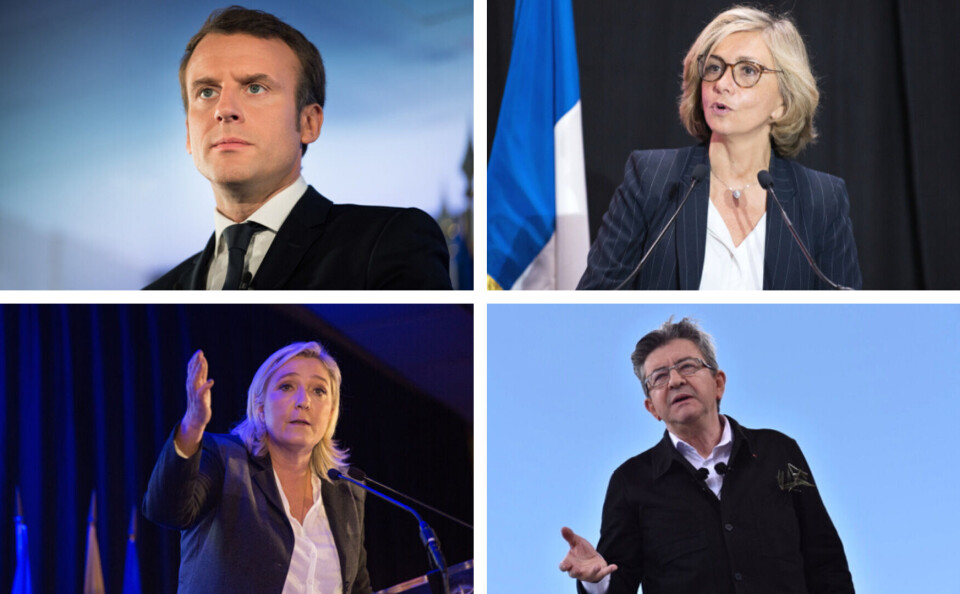-
Aer Lingus relaunches summer Nice-Cork service
Two flights per week between May and September link south of Ireland and France
-
Foreigners in France 'should be given local votes back'
Political right mobilised to try to halt debate on law extending rights
-
Is it time to stop changing the clocks in Europe?
Campaigners say it would help improve health and also reduce traffic accidents
France presidential election 2022: Official campaigns begin tomorrow
As the country gears up for the pre-election period, we summarise the key moments ahead and the most recent news from some of the high-profile candidates

The official presidential election campaign begins in France tomorrow, with some high-profile candidates taking part in early events this weekend. We summarise some of the key moments ahead.
The campaign season officially starts on March 28, ahead of the elections on April 10 and 24.
Some of the key dates have already passed, including the period from January 27 to March 4, when all candidates were required to gather at least 500 pledges of mayoral support from across France.
Read more: France's 2022 presidential election hopefuls race to find 500 backers
Candidates to benefit from strict system of equal coverage
From Monday, media outlets are required to give equal coverage and time to all candidates, and cannot be “explicitly negative” about any of them.
This is enforced by communication regulator l'Autorité de régulation de la communication audiovisuelle et numérique (Arcom).
Manifestos to be sent out
The official manifestos of candidates can now be sent out to the public, with the text set to be sent in paper form but also digitised and put online for public viewing. Around 48 million envelopes are sent out to the public for each election round, La Croix has calculated.
This costs around €64.5million.
Election posters to be put up
Official posters are now set to go up, including on billboards and poster sites near Mairies and other public buildings, including near schools and sports halls.
Each of the 12 candidates will have posters displayed. This is the responsibility of the local Mairie, regardless of its political leaning.
The number of posters permitted is five for communes with fewer than 500 voters, and 10 for communes with 201-5,000 voters. For towns and cities larger than this, the posters must also be proportionate to the number of voters.
Campaign TV clips to be broadcast
Each of the candidates will now have their TV campaign “adverts” broadcast on television.
The electoral campaign commission la Commission nationale de contrôle de la campagne électorale en vue de l'élection présidentielle (CNCCEP) will also put the clips online.
The state pays for the cost of these “official broadcasts”, with the length of the clips and the time broadcast determined by digital freedom authority la CNIL.
They must be shown “at significant listening/watching times, if necessary several times per day”, it states.
What are the most recent updates for the candidates?
Some of the 12 candidates have been campaigning or taking part in events this weekend. These include:
- Eric Zemmour - 800 security staff are expected to be present at a rally for the far-right candidate today (Sunday, March 27), at the Trocadero in Paris. The gathering is expected to attract tens of thousands of people, as the controversial candidate seeks to revive his falling place in the polls.
- Jean-Luc Mélenchon - The far-left candidate spoke at an event in Marseille, reiterating his hope of reaching the second round
- Yannick Jadot - The green candidate is set to hold a rally at the Zénith in Paris today
- Marine Le Pen - The far-right candidate claimed to have been “violently” disrupted by far-left protesters in Guadaloupe this weekend, as she recorded an address from her hotel in Gosier
- Emmanuel Macron - The sitting president and candidate is taking part in an interview on France 3 today, ahead of beginning his electoral campaign in Dijon (Côte d'Or) tomorrow. He is expected to talk about subjects such as young people, professional training, and local politics.
Related articles
French election candidates have to declare their wealth: Here it is
French presidential election: Which candidate does your mayor support?
'When I am president': The key policies of final 12 French candidates
Signatures, power transfer: Key dates for French presidential election
























